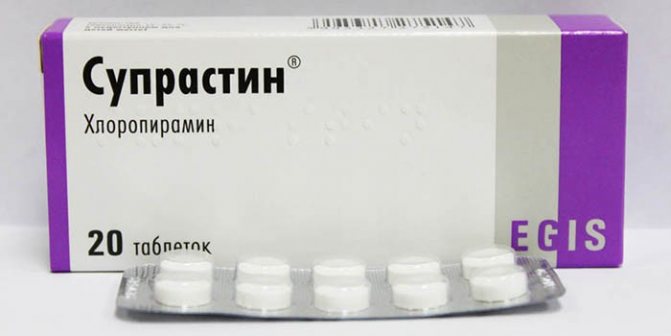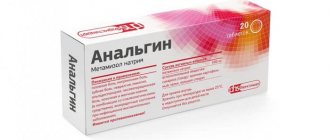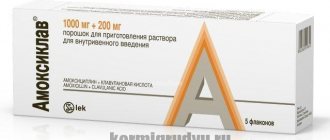What is Diazolin
This is a medication that has a sedative, antipruritic and antiallergic effect on the patient. Diazolin tablets contain Mebhydrolin (mnn), an active ingredient. This element acts as a histamine receptor blocker and reduces the likelihood of edema. Diazolin is most often taken for allergies, but the drug also has an anti-exudative effect.
The drug compares favorably with drugs of the first generation of medications in that it does not have a pronounced sedative effect and weakens the effect of histamine on the muscles of the intestines, bronchi, and uterus. The peak effectiveness of the drug is observed 2 hours after administration; the effect may persist for 2 days. The medicine was listed on the Russian radar and is sold in all pharmacies and online pharmacies along with instructions for use.
Indications for use
These tablets are widely popular when it is necessary to relieve the symptoms of a developing cold or allergic reaction. The following indications for the use of Diazolin are distinguished:
- for allergies in a child, starting from 3 years of age;
- Diazolin medicine is highly effective for food allergies;
- in case of an allergic reaction to other medications;
- for the symptomatic treatment of allergic conjunctivitis, rhinitis, urticaria;
- to relieve itching from insect bites, neurodermatitis, eczema, dermatoses;
- relieves the condition, relieves swelling in hay fever, bronchial asthma, serum sickness.
Contraindications
The medicine is highly effective, but has a number of prohibitions that must be observed. Diazolin - instructions for use contain descriptions of all cases in which the drug should not be taken. This may lead to complications of the condition, disruption of the functioning of certain organs, or to side effects. There are the following main contraindications for Diazolin:
- epilepsy;
- duodenal ulcer;
- pregnancy;
- inflammation of the intestinal walls;
- prostatic hypertrophy;
- heart rhythm disturbances;
- stomach ulcer;
- pyloric stenosis;
- glucose/lactose intolerance;
- atony of the bladder, intestines;
- chronic gastrointestinal diseases in the acute stage;
- angle-closure glaucoma;
- during lactation.

Side effects
When using the medication, it is important to follow the instructions, because violating the dosage can lead to negative consequences. The following side effects of Diazolin are identified, which affect different body systems:
- Nervous system, sensory organs: paresthesia, increased fatigue, dizziness. At high doses, blurred vision, slow reaction, and drowsiness are observed. Children may experience sleep disturbances, irritability, tremors, and increased excitability.
- Digestive system: heartburn, nausea, dry mouth, epigastric pain, dyspeptic disorders, vomiting, constipation, irritation of the gastric mucosa.
- Urinary system – urinary disorders.
- Hematopoietic organs: granulocytopenia, agranulocytosis.
- In the presence of liver and kidney diseases, signs of the toxic effect of the drug may appear, which provokes an increase in the severity of negative consequences. It is necessary to reduce the dosage of use according to the instructions.
Types of antihistamines and compatibility with lactation
Currently, there are 3 generations of antihistamines:
1. 1st generation drugs. These include Cyproheptadine, Hifenadine, Clemastine, Suprastin, Promethazine, Diazolin, Diphenhydramine, Diprazine.
All of them have sedative properties and cause drowsiness, heart rhythm disturbances, penetrate the blood-brain barrier and affect the nervous system.
According to the e-lactancia.org directory of compatibility of drugs and breastfeeding, the effects of the following antihistamines on the child and nursing mother were studied:
- Clemastine - high risk (not compatible with breastfeeding), may inhibit the lactation process, the child experienced lethargy, irritability and tearfulness, and breast refusal;
- Diprazine - high risk, single dose is possible (for example, before surgery or in case of emergency), long-term use is not compatible with breastfeeding;
- Diphenhydramine - low risk, can be used in small doses and for a short time, if the child is older than 1 month and full-term, due to its high binding ability to bind to plasma proteins, it slightly penetrates into breast milk;
- Cyproheptadine, Hifenadine, Suprastin, Promethazine, Diazolin - no studies have been conducted.
Read also:
Endocervicitis in nursing mothers after childbirth
2. 2nd generation drugs. Loratadine, Astemizole, Cetirizine, Acrivastine, Terfenadine, Ebastine, Azelastine. Advantages: once a day, no effect on the cardiovascular system, does not cause increased drowsiness, can be taken for a long time.
- Cetirizine (trade names Alerza, Zirtec, Letizen, Zincet, Zodak, Cetrin, etc.) - compatible with breastfeeding; when treating a nursing mother for a month, no short-term or long-term side effects were found; due to the high ability to bind to plasma proteins, excretion into breast milk is unlikely;
- Loratadine (trade names Alerpriv, Clalergin, Clargotil, Claritin, Lominal, Loratadine, etc.) - according to the American Academy of Pediatricians and the British Society of Immunology and Allergy, compatible with breastfeeding, no side effects were observed in a nursing mother or child, excreted into breast milk in trace quantities;
- Terfenadine - low risk, can be used for a short time for treatment, with caution in cardiac arrhythmias, irritability has been reported in breastfed children;
- Acrivastine, Ebastine are low-risk drugs.
3. 3rd generation drugs. Levocetirizine, Fexofenadine, Desloratadine, Sehifenadine. Second generation metabolites with increased efficiency. Like 2nd generation drugs, they have a minimal number of side effects and are free of cardiotoxic effects.
- Levocetirizine is a low-risk drug, conditionally compatible with breastfeeding, can be taken with caution, monitoring the child’s reaction;
- Desloratadine, Fexofenadine according to the e-lactancia reference book are compatible with breastfeeding - the active substances are excreted into breast milk in trace amounts, no side effects were observed when treating a nursing mother and child.
Diazolin instructions
It is important to know the rules for using the medication to avoid the side effects described above. The tablets are sold without a prescription; each package must contain instructions for Diazolin, which describe all the indications for the use of the drug and the dosage for different ages. Below will be presented methods for taking the drug at different ages, indicated in the annotation.
Diazolin for children
The release form for this age group is granules in a bottle. Diazolin for children is mixed in 100 ml of warm water. Mix the contents thoroughly and stir for several minutes. The resulting suspension must be poured into a graduated glass to accurately determine the dose. The product should be taken for a week after meals. Be sure to shake the suspension first. According to the instructions, the following rules for using the medicine for a child are outlined:
- children's age 3 years – 2.5 ml;
- children's age 4-6 – 5 ml;
- age 7-10 years – you need to give 7.5 ml.
Diazolin for adults
All people over 12 years of age take this medication in the same dosage. Diazolin for adults is taken 2 times a day in a dosage of 100 mg. At one time, the dose should not exceed 300 mg, the maximum daily value is 600 mg. The instructions for use, which are in the packaging of the medicine, describe in detail how to take Diazolin for adults. The duration of the course of treatment is determined individually by the doctor.

Diazolin during breastfeeding
This is a relatively strong antiallergic drug, so taking medications while pregnant is highly undesirable. It is strictly prohibited to use it in the second and first trimester. Diazolin is also contraindicated during breastfeeding, because the active substance can enter the bloodstream through the intestines and pose a threat to the baby. For a child under 3 years of age, the medicine will be dangerous even in the quantities contained in breast milk.
Diazolin during breastfeeding: is the drug allowed for young mothers?
However, during pregnancy and breastfeeding, not everything is clear. If you look at the instructions, Diazolin and lactation are incompatible. It is highly undesirable to use Diazolin throughout pregnancy, especially in the first trimester. But the fact is that if the mother is allergic or she suddenly developed symptoms of this disease, then it is also prohibited to ignore this. Allergies are more than just sneezing and runny nose.
Girls, has anyone taken Diazolin while breastfeeding?
Any participant can answer in conferences and start new topics, regardless of whether they are registered on the 7ya website.
From whom:. You are not authorized. If you send a message anonymously, you will lose the ability to edit or delete the message after it is sent. The materials on the site are informational in nature and intended for educational purposes. The editors' opinions may not coincide with the opinions of the authors. VIDEO ON THE TOPIC: How to care for your breasts while breastfeeding? Philips Avent tips.
Diazolin analogues and substitutes
In case of individual intolerance, the medication can be replaced. There are analogues and substitutes for Diazolin, which belong to the same pharmacological group and have the same effect after use. Some of them are cheap, others are expensive, but the principle of operation and application is the same. If you were unable to buy the drug, then you can choose any analogue of Diazolin described below:
- Cetrin;
- Erius;
- Betadrine;
- Vibrocil;
- Zyrtec;
- Claritin;
- Suprastin;
- Tavegil in ampoules.

3rd generation antihistamines and their features
Among these antihistamines, it is worth highlighting Gismanal. It is available in different forms, but when breastfeeding, it is not tablets that are recommended, but a suspension, although it acts more slowly.
Gismanal also helps well with hay fever, accompanied by a runny nose, and with urticaria and allergic dermatitis. The first result of its use will be noticeable only after 24 hours from the moment of administration. Among its disadvantages, one can note an increase in appetite and dry mucous membranes. Sometimes tachycardia may occur.

Trexil is a somewhat controversial drug. It is used for urticaria, contact dermatitis, allergic rhinitis and even bronchial asthma. It does not cause drowsiness and does not increase intraocular pressure. But no studies have been conducted regarding its effects on nursing mothers and children. What is clear is that it can pass into breast milk, and doctors prescribe it much less frequently than other drugs.
Of the third generation drugs, Telfast is considered the most effective. It does not affect the functioning of the heart, is not addictive, and quickly relieves the symptoms of an allergic reaction. However, studies have shown that fexofenadine hydrochloride, which is part of it, is harmful to the child. Therefore, in general, this drug is contraindicated during breastfeeding.

But since it allows you to quickly eliminate swelling, it is prescribed for the most severe form of urticaria - for angioedema, which affects the mucous membrane of the pharynx, causing its narrowing and difficulty breathing. Angioedema in the absence of timely treatment can even lead to death. Therefore, if there is such a threat, then Telfast is still prescribed, but breastfeeding is stopped for this time.
It is used mainly to treat allergic rhinitis caused by seasonal flowering, as well as chronic urticaria.
But it is contraindicated for nursing mothers and can easily be replaced with a safer product.
Another third-generation drug, Fexadin, intended for the treatment of allergic rhinitis, conjunctivitis, and chronic urticaria, is also contraindicated during lactation.
This remedy is not even prescribed to children under 12 years of age. Its side effects include dyspepsia, severe headaches and even anaphylactic reactions.
Modern antihistamines are relatively harmless and highly effective. But during lactation they cannot be taken for prophylaxis, just in case. In addition, they do not combine well with other medications, such as antibiotics. You cannot drink them at the same time.
Reviews
Olga, 29 years old
I often use Diazolin for colds because it has a mild sedative and anti-inflammatory effect. According to the rules, it is used several times a day, but I decided to drink it only before bed to make it easier to sleep. According to the instructions, the drug can act for 2 days, so 1 tablet is enough for me during treatment.
Sergey, 26 years old
Based on reviews from my friends, I bought Diazolin allergy pills. Every spring I suffer from a mild allergic reaction to the color of trees. Considering that the price of Diazolin in tablets is relatively low, I decided to try it anyway. The medication helps a lot, I can easily fall asleep, and I don’t have coughing or sneezing at night.
Anton, 32 years old
In dentistry, after tooth extraction, an antibiotic is prescribed to prevent inflammation and it is immediately recommended to drink Diazolin. According to friends' reviews, it even helps with toothache. To avoid overdose, check with your doctor how much tablets you should take. The doctor told me that 3 days of using Diazolin after tooth extraction, 1 tablet per knock, will be enough.
Indications and contraindications
- allergic rhinitis;
- inflammation and conjunctiva of an allergic nature;
- seasonal allergic rhinoconjunctivitis;
- chronic allergies;
- itchy dermatosis;
- Quincke's edema;
- insect allergy.
The drug is used for bronchial asthma as part of complex therapy.
The drug eliminates allergy symptoms and prevents its further development. The medication is allowed to be used for a long time, as it does not cause addiction. The drug is prescribed to children from 2 years of age, as it does not contain toxic substances.
An antiallergic drug should not be taken if the patient has hypersensitivity to its components. The drug should be used with caution during pregnancy, breastfeeding, and in persons with functional liver and kidney failure.
As a result of taking the medication, attention is reduced, and therefore it is not recommended to take it before driving a car or operating complex equipment.

All possible side effects:
- headache;
- nausea, vomiting;
- exhaustion, increased craving for sleep;
- increased blood flow to various organs and tissues;
- runny nose, sneezing;
- inflammation of the paranasal sinuses;
- increased content of gases in the intestines;
- hypermenorrhea;
- visual disturbances;
- indigestion;
- disturbance of taste sensations;
- excessive secretion of tear fluid;
- defecation disorders (diarrhea and constipation);
- hearing disorders;
- anorexia.

If you notice at least one of the above symptoms, stop taking the drug and consult your doctor.











